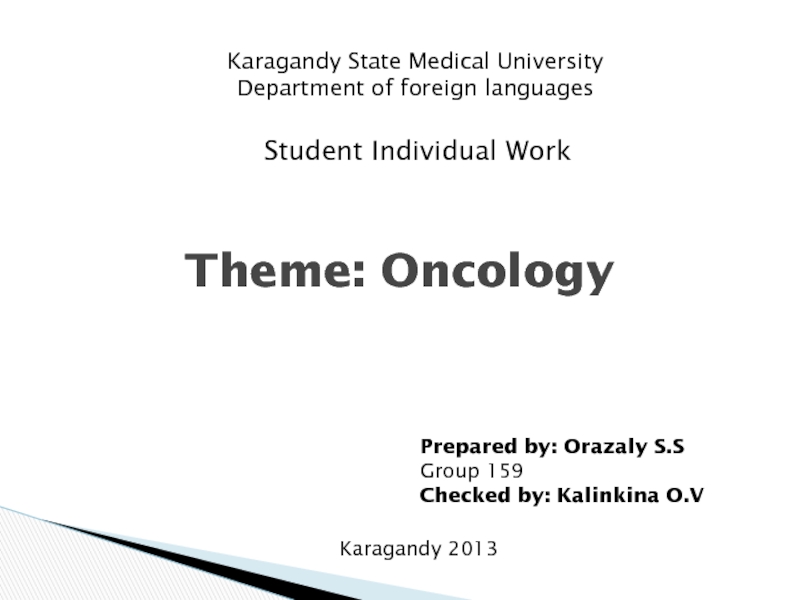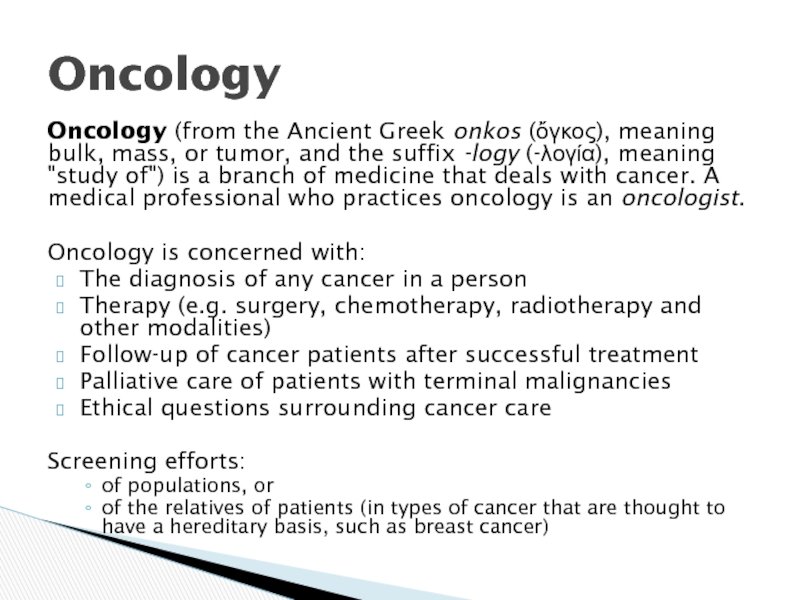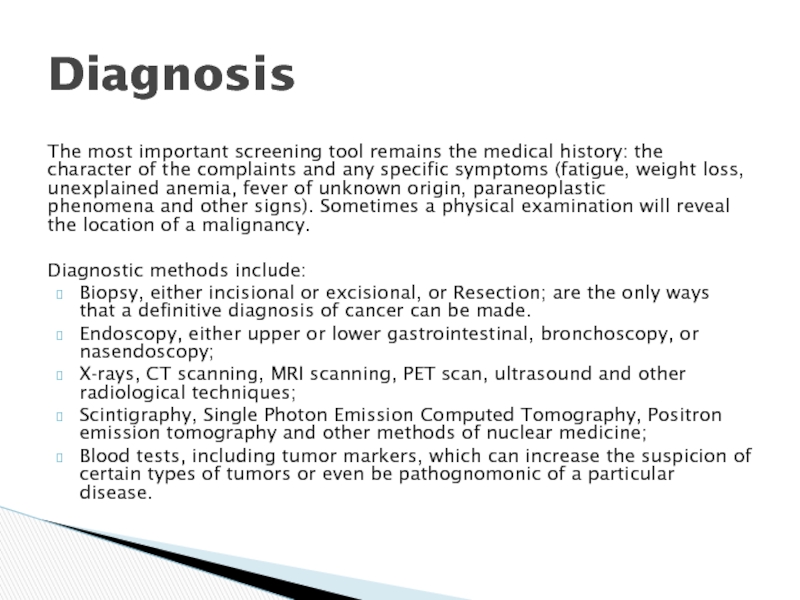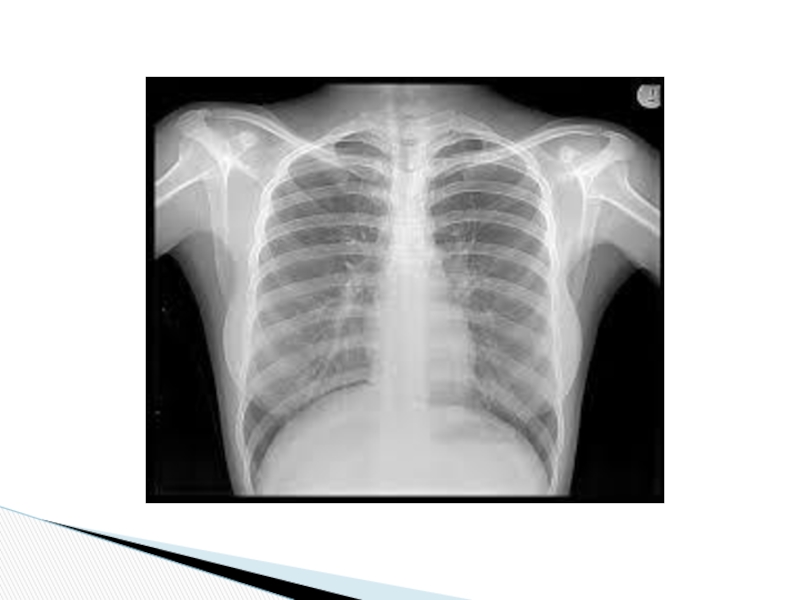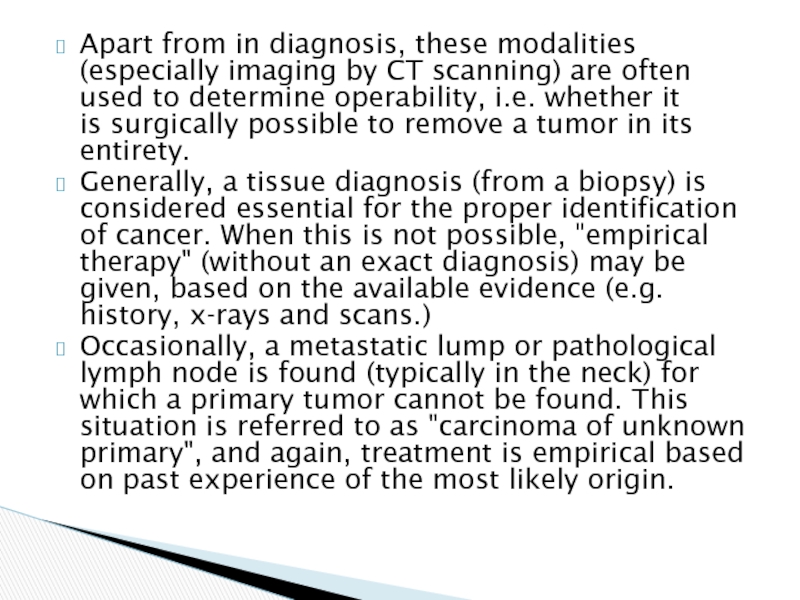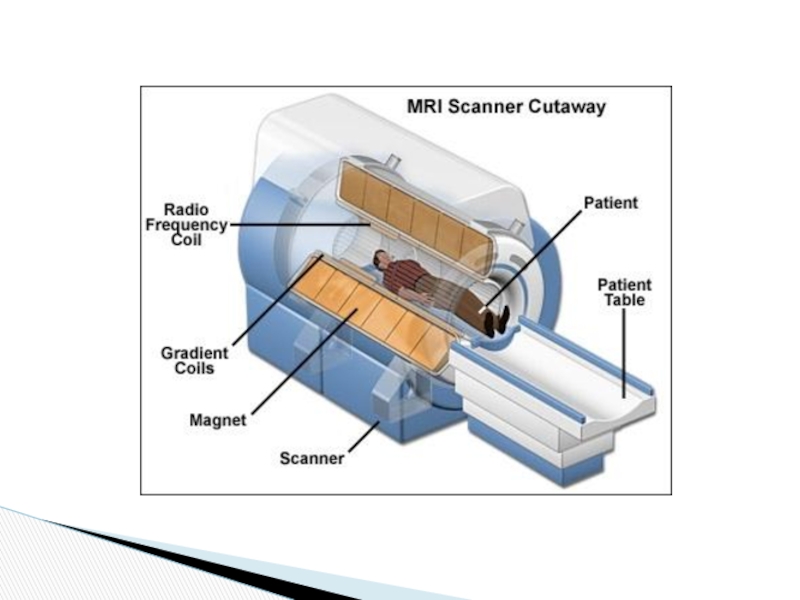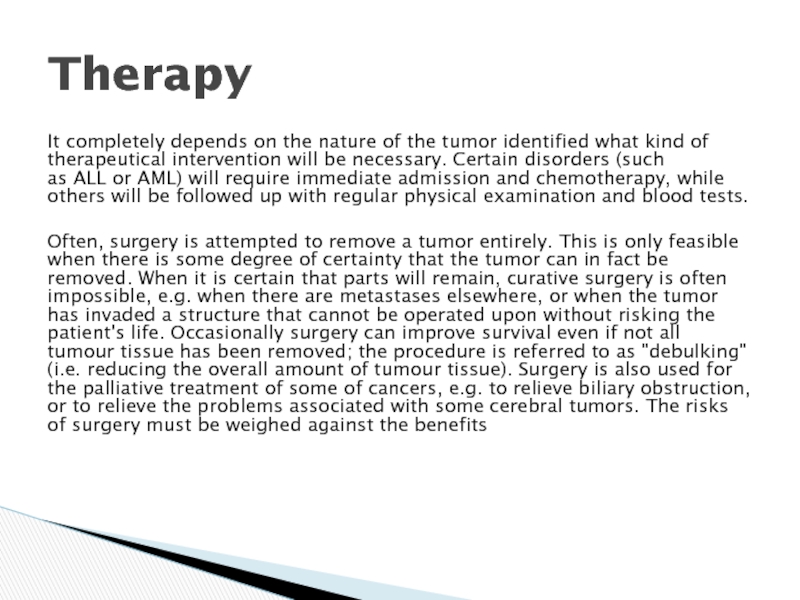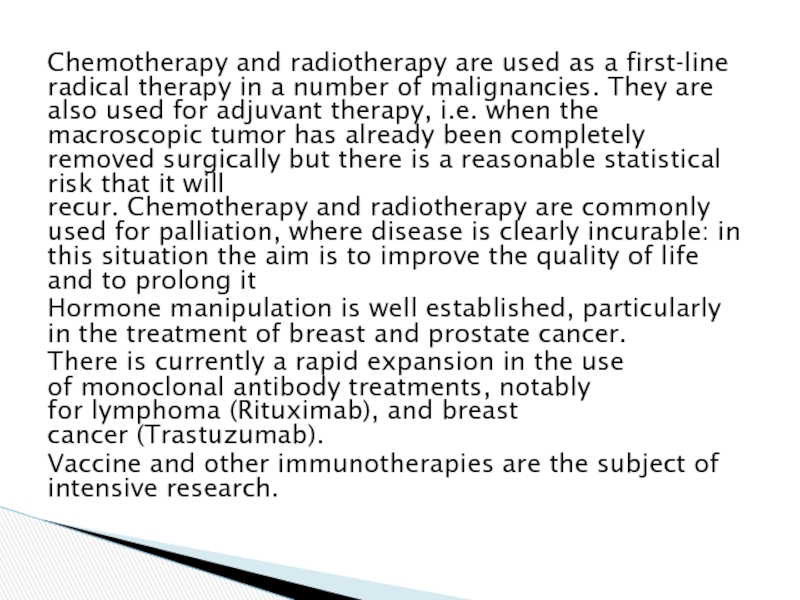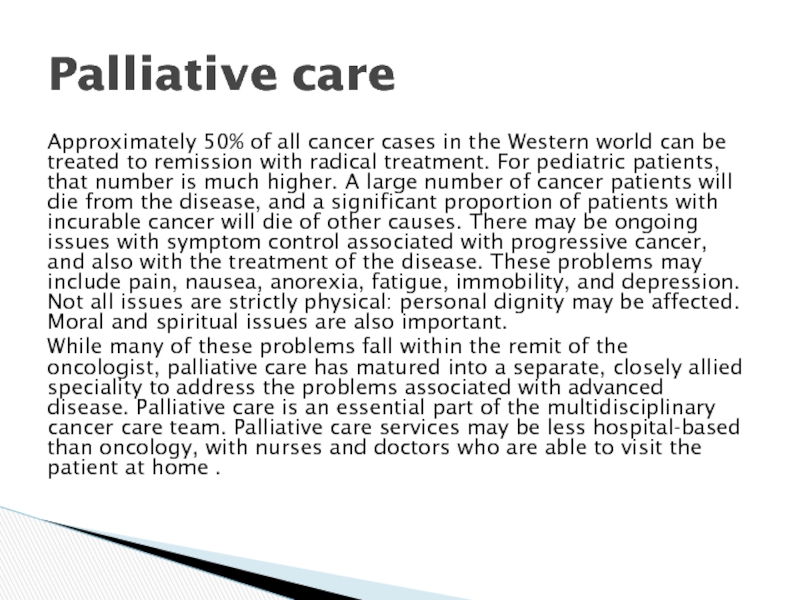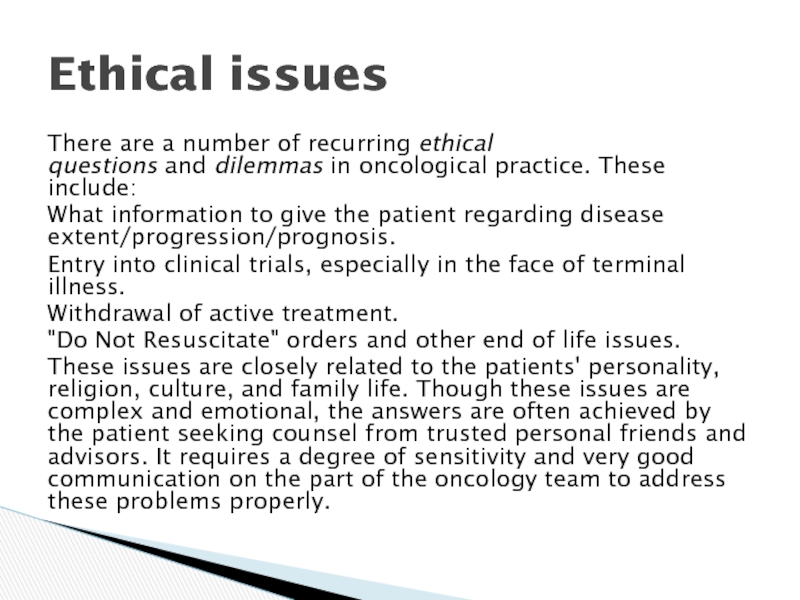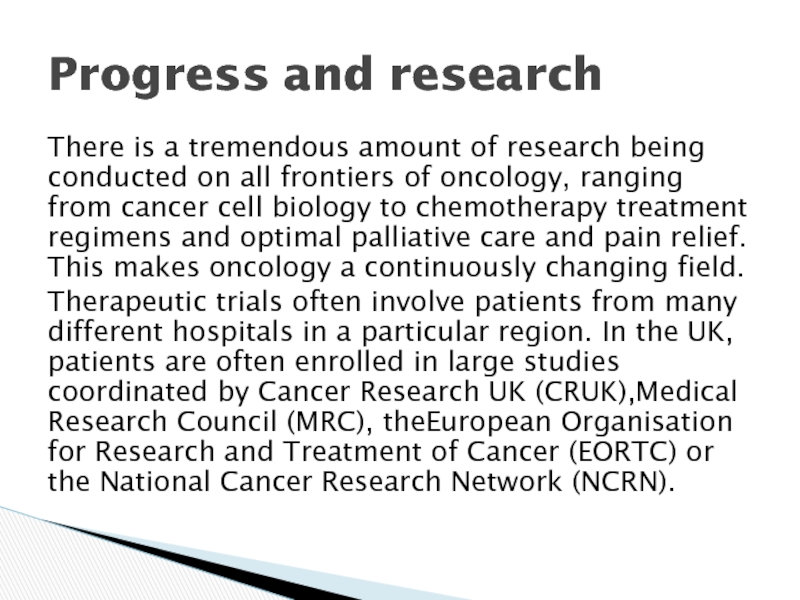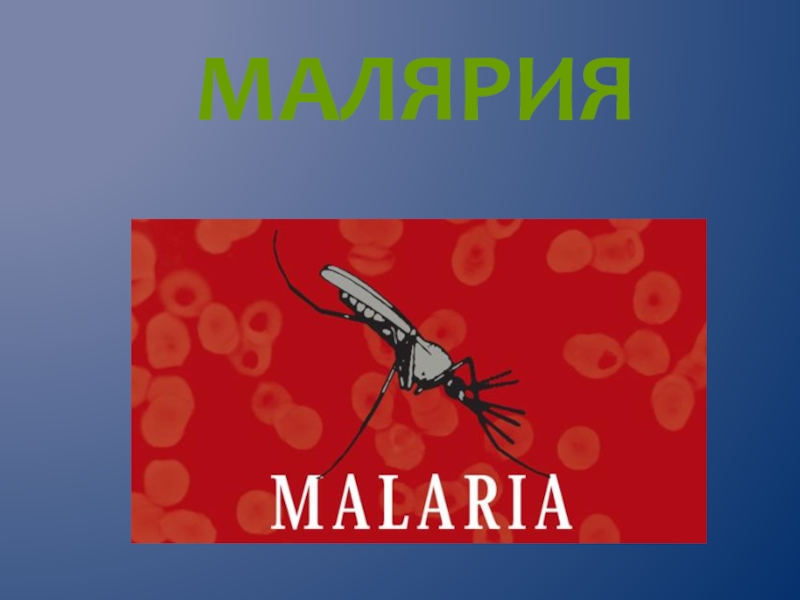Разделы презентаций
- Разное
- Английский язык
- Астрономия
- Алгебра
- Биология
- География
- Геометрия
- Детские презентации
- Информатика
- История
- Литература
- Математика
- Медицина
- Менеджмент
- Музыка
- МХК
- Немецкий язык
- ОБЖ
- Обществознание
- Окружающий мир
- Педагогика
- Русский язык
- Технология
- Физика
- Философия
- Химия
- Шаблоны, картинки для презентаций
- Экология
- Экономика
- Юриспруденция
Theme: Oncology
Содержание
- 1. Theme: Oncology
- 2. Oncology (from the Ancient Greek onkos (ὄγκος), meaning bulk, mass,
- 3. The most important screening tool remains the
- 4. Слайд 4
- 5. Apart from in diagnosis, these modalities (especially
- 6. Слайд 6
- 7. It completely depends on the nature of
- 8. Chemotherapy and radiotherapy are used as a first-line radical therapy
- 9. Слайд 9
- 10. Approximately 50% of all cancer cases in
- 11. There are a number of recurring ethical questions and dilemmas in
- 12. There is a tremendous amount of research
- 13. Слайд 13
- 14. There are several sub-specialties within oncology. Moreover,
- 15. In the United Kingdom and several other
- 16. Скачать презентанцию
Oncology (from the Ancient Greek onkos (ὄγκος), meaning bulk, mass, or tumor, and the suffix -logy (-λογία), meaning "study of") is a branch of medicine that deals with cancer. A medical professional who practices oncology is an oncologist.Oncology is
Слайды и текст этой презентации
Слайд 1Theme: Oncology
Karagandy State Medical University
Department of foreign languages
Student Individual
Work
Слайд 2Oncology (from the Ancient Greek onkos (ὄγκος), meaning bulk, mass, or tumor, and the
suffix -logy (-λογία), meaning "study of") is a branch of medicine that
deals with cancer. A medical professional who practices oncology is an oncologist.Oncology is concerned with:
The diagnosis of any cancer in a person
Therapy (e.g. surgery, chemotherapy, radiotherapy and other modalities)
Follow-up of cancer patients after successful treatment
Palliative care of patients with terminal malignancies
Ethical questions surrounding cancer care
Screening efforts:
of populations, or
of the relatives of patients (in types of cancer that are thought to have a hereditary basis, such as breast cancer)
Oncology
Слайд 3The most important screening tool remains the medical history: the
character of the complaints and any specific symptoms (fatigue, weight loss,
unexplained anemia, fever of unknown origin, paraneoplastic phenomena and other signs). Sometimes a physical examination will reveal the location of a malignancy.Diagnostic methods include:
Biopsy, either incisional or excisional, or Resection; are the only ways that a definitive diagnosis of cancer can be made.
Endoscopy, either upper or lower gastrointestinal, bronchoscopy, or nasendoscopy;
X-rays, CT scanning, MRI scanning, PET scan, ultrasound and other radiological techniques;
Scintigraphy, Single Photon Emission Computed Tomography, Positron emission tomography and other methods of nuclear medicine;
Blood tests, including tumor markers, which can increase the suspicion of certain types of tumors or even be pathognomonic of a particular disease.
Diagnosis
Слайд 5Apart from in diagnosis, these modalities (especially imaging by CT scanning)
are often used to determine operability, i.e. whether it is surgically possible to
remove a tumor in its entirety.Generally, a tissue diagnosis (from a biopsy) is considered essential for the proper identification of cancer. When this is not possible, "empirical therapy" (without an exact diagnosis) may be given, based on the available evidence (e.g. history, x-rays and scans.)
Occasionally, a metastatic lump or pathological lymph node is found (typically in the neck) for which a primary tumor cannot be found. This situation is referred to as "carcinoma of unknown primary", and again, treatment is empirical based on past experience of the most likely origin.
Слайд 7It completely depends on the nature of the tumor identified what kind
of therapeutical intervention will be necessary. Certain disorders (such as ALL or AML)
will require immediate admission and chemotherapy, while others will be followed up with regular physical examination and blood tests.Often, surgery is attempted to remove a tumor entirely. This is only feasible when there is some degree of certainty that the tumor can in fact be removed. When it is certain that parts will remain, curative surgery is often impossible, e.g. when there are metastases elsewhere, or when the tumor has invaded a structure that cannot be operated upon without risking the patient's life. Occasionally surgery can improve survival even if not all tumour tissue has been removed; the procedure is referred to as "debulking" (i.e. reducing the overall amount of tumour tissue). Surgery is also used for the palliative treatment of some of cancers, e.g. to relieve biliary obstruction, or to relieve the problems associated with some cerebral tumors. The risks of surgery must be weighed against the benefits
Therapy
Слайд 8Chemotherapy and radiotherapy are used as a first-line radical therapy in a number
of malignancies. They are also used for adjuvant therapy, i.e. when the
macroscopic tumor has already been completely removed surgically but there is a reasonable statistical risk that it will recur. Chemotherapy and radiotherapy are commonly used for palliation, where disease is clearly incurable: in this situation the aim is to improve the quality of life and to prolong itHormone manipulation is well established, particularly in the treatment of breast and prostate cancer.
There is currently a rapid expansion in the use of monoclonal antibody treatments, notably for lymphoma (Rituximab), and breast cancer (Trastuzumab).
Vaccine and other immunotherapies are the subject of intensive research.
Слайд 10Approximately 50% of all cancer cases in the Western world
can be treated to remission with radical treatment. For pediatric patients, that
number is much higher. A large number of cancer patients will die from the disease, and a significant proportion of patients with incurable cancer will die of other causes. There may be ongoing issues with symptom control associated with progressive cancer, and also with the treatment of the disease. These problems may include pain, nausea, anorexia, fatigue, immobility, and depression. Not all issues are strictly physical: personal dignity may be affected. Moral and spiritual issues are also important.While many of these problems fall within the remit of the oncologist, palliative care has matured into a separate, closely allied speciality to address the problems associated with advanced disease. Palliative care is an essential part of the multidisciplinary cancer care team. Palliative care services may be less hospital-based than oncology, with nurses and doctors who are able to visit the patient at home .
Palliative care
Слайд 11There are a number of recurring ethical questions and dilemmas in oncological practice. These
include:
What information to give the patient regarding disease extent/progression/prognosis.
Entry into clinical
trials, especially in the face of terminal illness.Withdrawal of active treatment.
"Do Not Resuscitate" orders and other end of life issues.
These issues are closely related to the patients' personality, religion, culture, and family life. Though these issues are complex and emotional, the answers are often achieved by the patient seeking counsel from trusted personal friends and advisors. It requires a degree of sensitivity and very good communication on the part of the oncology team to address these problems properly.
Ethical issues
Слайд 12There is a tremendous amount of research being conducted on
all frontiers of oncology, ranging from cancer cell biology to chemotherapy treatment
regimens and optimal palliative care and pain relief. This makes oncology a continuously changing field.Therapeutic trials often involve patients from many different hospitals in a particular region. In the UK, patients are often enrolled in large studies coordinated by Cancer Research UK (CRUK),Medical Research Council (MRC), theEuropean Organisation for Research and Treatment of Cancer (EORTC) or the National Cancer Research Network (NCRN).
Progress and research
Слайд 14There are several sub-specialties within oncology. Moreover, oncologists often develop
an interest and expertise in the management of particular types
of cancer.Oncologists may be divided on the basis of the type of treatment provided.
Radiation oncology: treatment primarily with radiation, a process called radiotherapy.
Surgical oncology: surgeons who specialize in tumor removal.
Medical oncology: treatment primarily with drugs, e.g. chemotherapy
Interventional oncology: interventional radiologists who specialize in minimally invasive image guided tumor therapies.
Gynecologic oncology: focuses on cancers of the female reproductive system.
Pediatric oncology: concerned with the diagnosis and treatment of cancer in children
Anatomical pathology: concerned with the definitive diagnosis of cancers of all types, for which treatment can be rendered by oncologists.
Specialties
Слайд 15In the United Kingdom and several other countries, oncologists may
be either clinical or medical oncologists. The main difference is that clinical oncologists
deliver radiotherapy, while medical oncologists do not. In North America, the terms, radiation oncologist and medical oncologist are more frequent.In most countries it is now common that patients are treated by a multidisciplinary team. These teams meet on a regular basis and discuss the patients under their care. These teams consist of the medical oncologist, a clinical oncologist or radiotherapist, a surgeon (sometimes there is a second reconstructive surgeon), a radiologist, a pathologist, an organ specific specialist such as a gynecologist or dermatologist, and sometimes the general practitioner is also involved. These disease oriented teams are sometimes in conflict with the general organisation and operation in hospitals. Historically hospitals are organised in an organ or technique specific manner. Multidisciplinary teams operate over these borders and it is sometimes difficult to define who is in charge.
